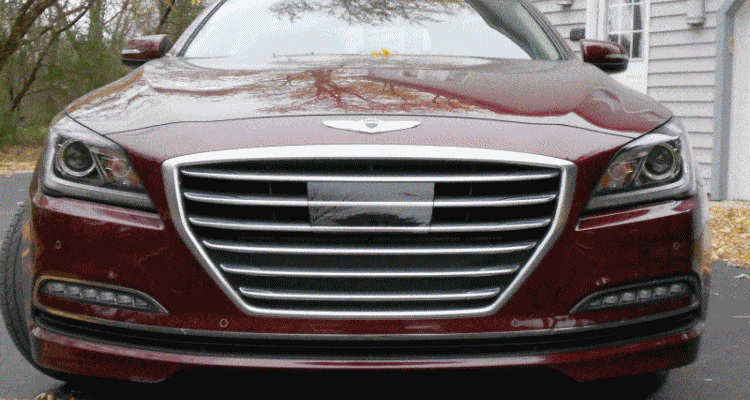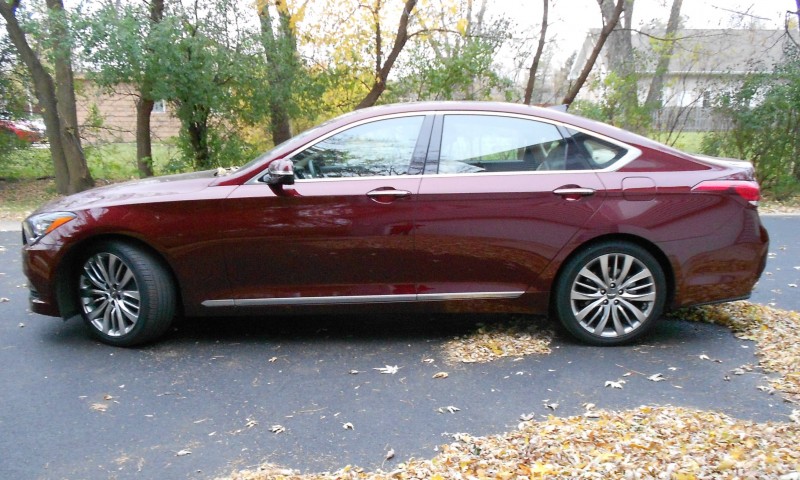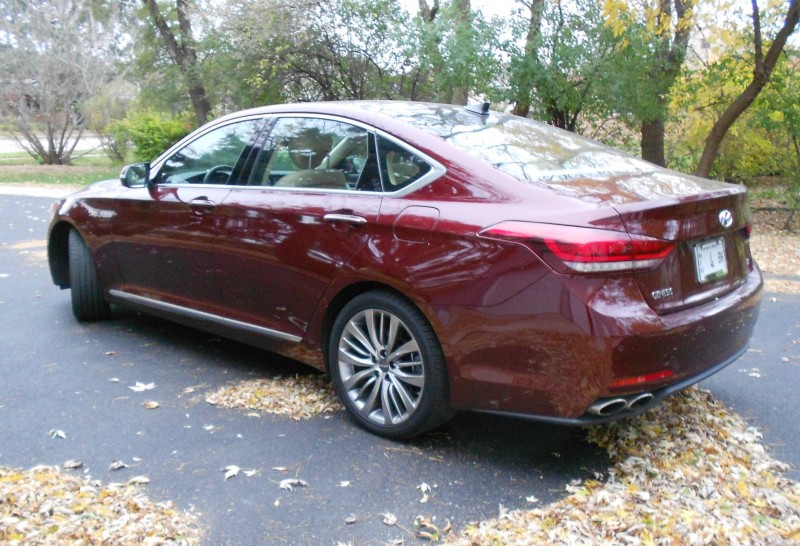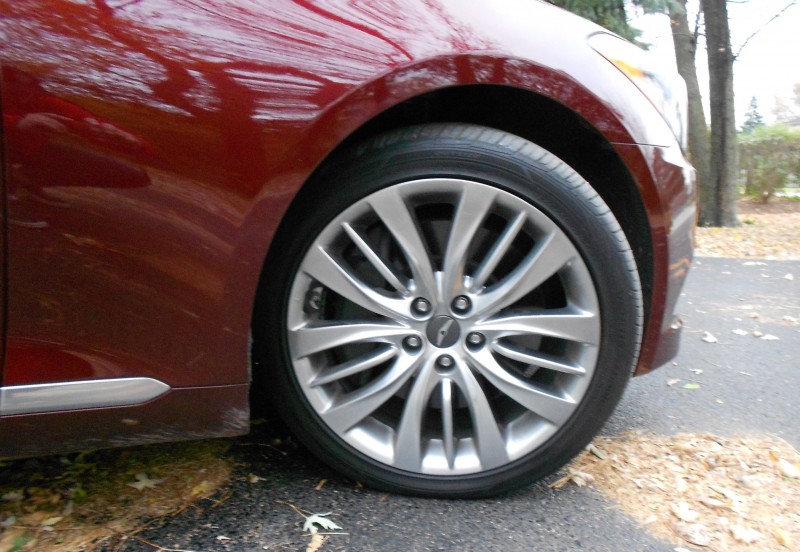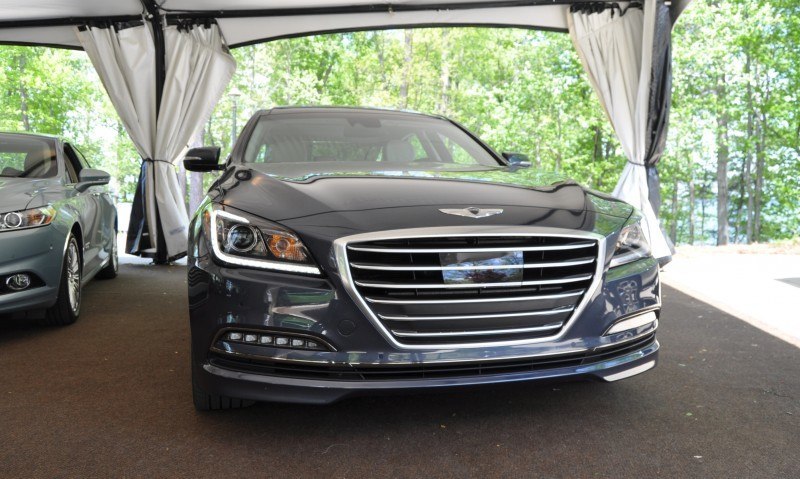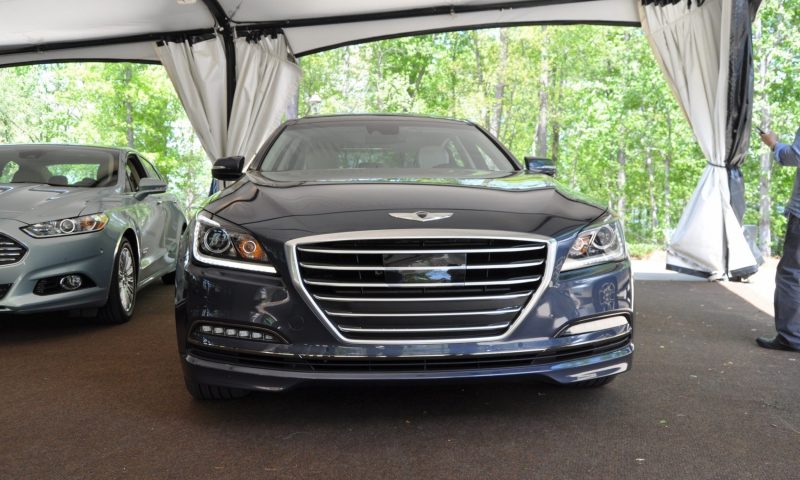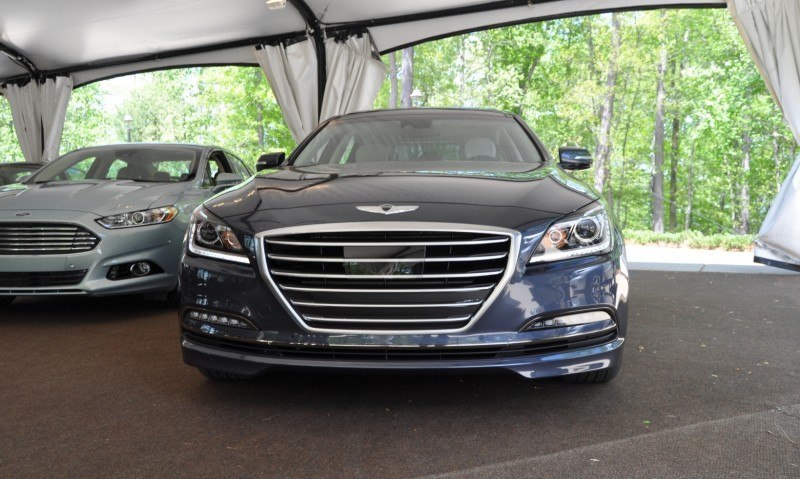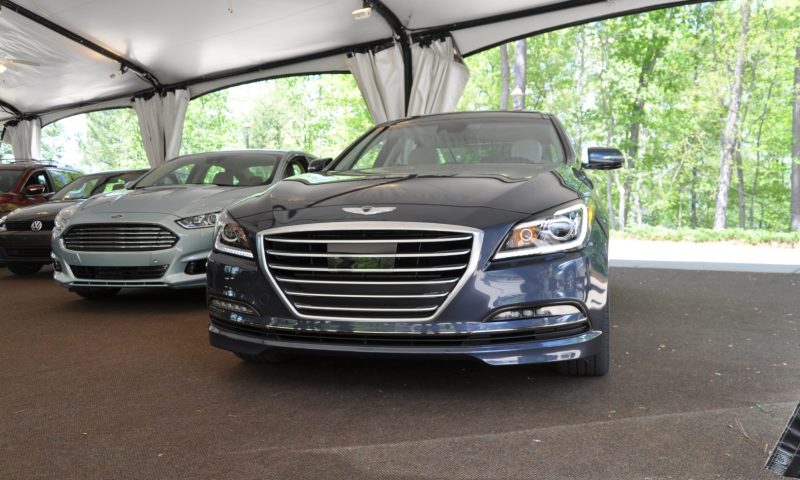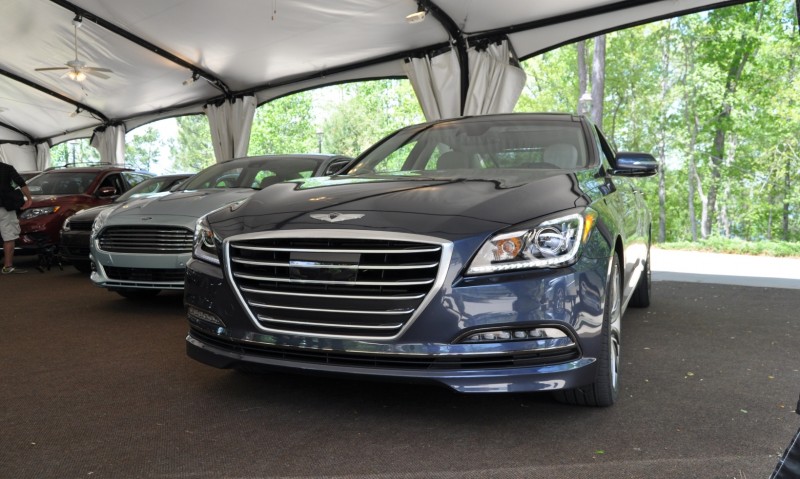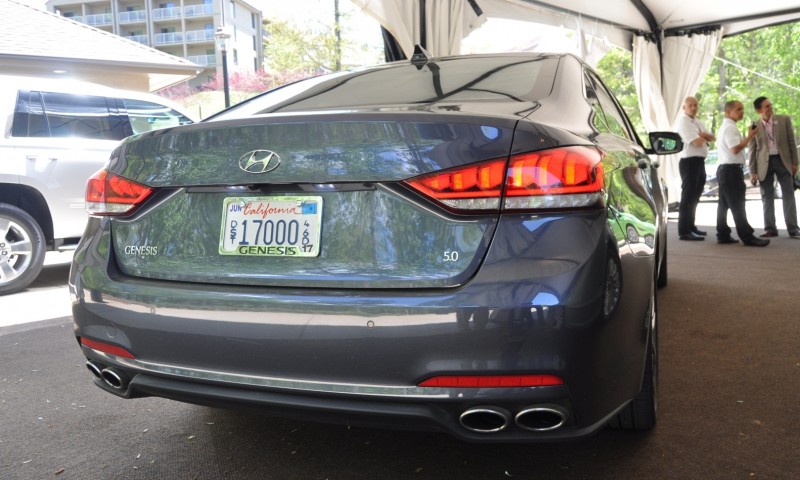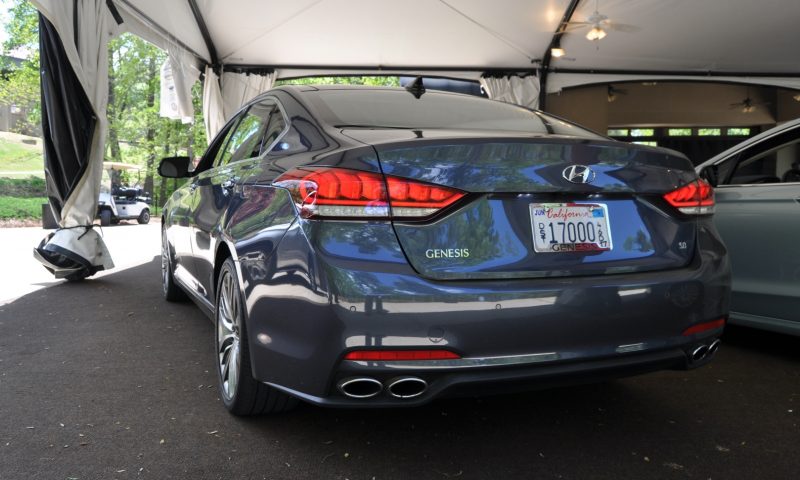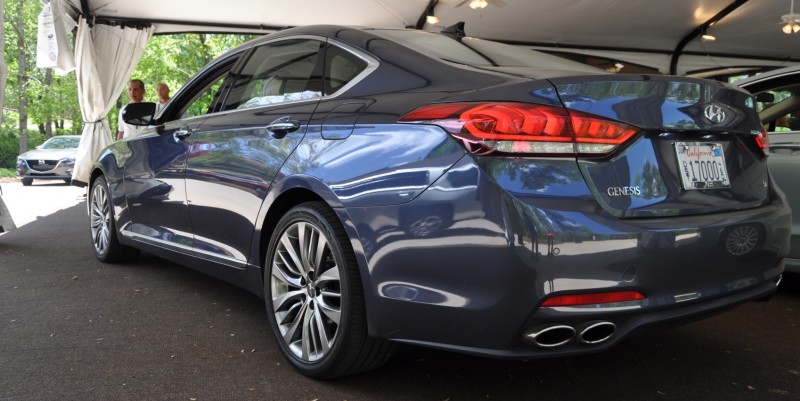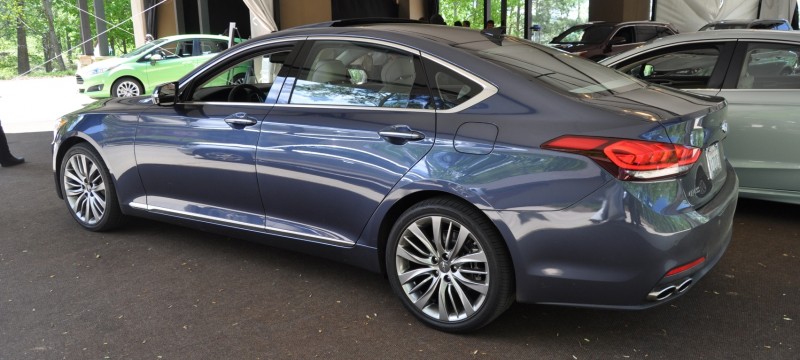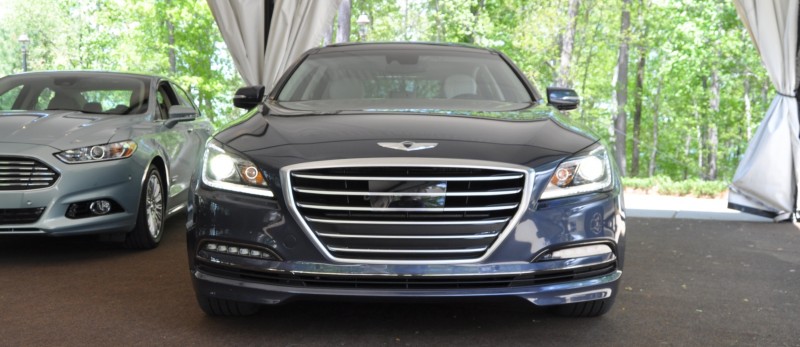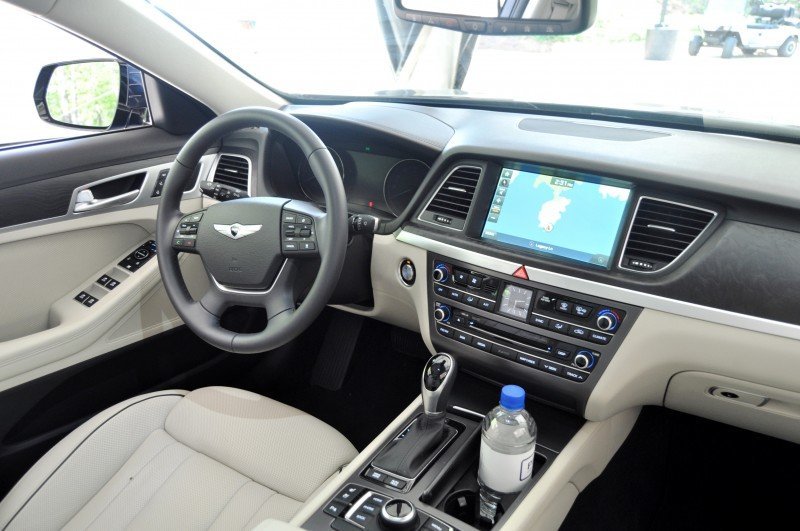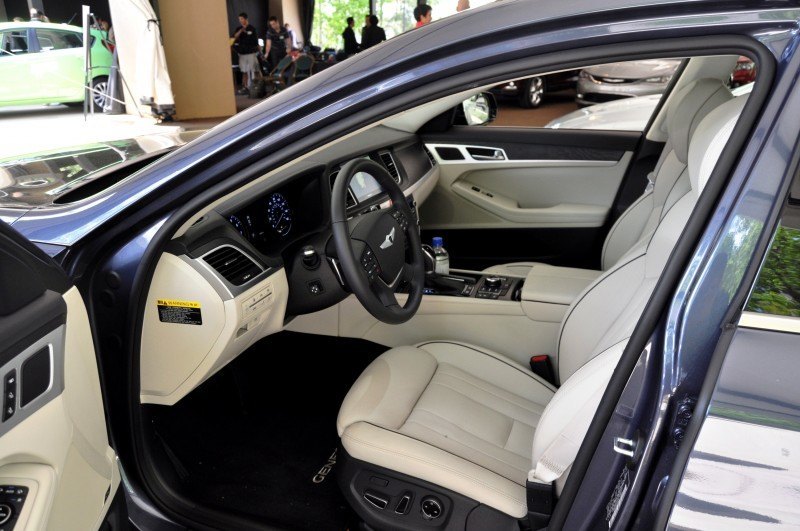2015 Hyundai Genesis 5.0 Review
By Ken Glassman
If you got behind the wheel of the new Hyundai Genesis 5.0 and didn’t know who manufactured the car, you’d swear you were driving a German luxury car, like the E-class Mercedes, or 5-Series BMW, or Audi A6. Only after looking at the price tag would you know that it couldn’t be one of those European makes, because a similarly equipped German sedan would cost at least 6 to 10 grand more. The Genesis is both an outstanding car in its own right, and an outstanding value.
V-8 engines are becoming more rare every year, with smaller supercharged or turbocharged V-6 engines becoming more of the norm. (The base Genesis has a 3.8 liter 311hp V-6) But Hyundai’s 5.0 liter V-8 is a gem of a powerplant, which puts out 420 horsepower and 383 ft. lbs. of torque. And all of that delicious power comes on so smoothly and quietly, you’d be hard pressed to know by the seat of your pants, that you’ll reach 60mph is a brief 5 seconds. And each shift of the 8-speed manumatic transmission is almost imperceptible, as your speed climbs rapidly.
Despite the curb weight of just over 4500 lbs., a quick stomp on the accelerator will downshift you into the powerband and rocket the Genesis forward to quickly put any traffic in front of you into your rear view mirror. And you can choose to use the steering wheel paddle shifters, or the shift lever to choose the gears yourself. The penalty for all that power is gas mileage . . . 15 City and 23 Highway. But at least premium fuel is not required.
Swift acceleration is not the only impressive trait for the Genesis. Riding on a 118.5” wheelbase, the suspension tuning is spot on, with some help from Lotus Engineering. Despite the comfortable ride quality that gobbles up pot holes and washboard roads, there’s no wallowing over dips from underdamped shock settings. And when you push this large sedan into tight turns, the big 19” Hankook tires claw at the pavement for grip, while the rock solid chassis and suspension limits the lean and won’t allow the driver to feel tossed from side to side. And even if it did, the driver’s seat has inflatable side bolsters to comfortably lock the driver in place. That’s a really cool feature.
Aiding the handling is the nicely dialed in steering feel. It would seem that the same engineers who helped with the suspension tuning, worked on the steering rack. The driver gets responsive steering with the right amount of effort, a good on-center feel and everything is communicated back to the driver’s hands, so you feel like you’re in complete control. The only vibration you feel through the steering wheel is when the lane assist system is on and you stray over a lane line.
The brakes on the big Genesis are effective, but there is a bit more pedal travel before you get to the bite. You can get used to it easier than brakes that bite too early. And I had to test the ABS system on wet pavement, when some knucklehead swerved to cut me off in traffic, and I can say the system worked just fine, with the gentle pulse sensation to let you know you won’t skid to a halt.
As impressive as the power, ride and handling capabilities are, the cabin is where the new Genesis shines. First of all it is as quiet as any luxury vehicle I’ve ever driven, except for perhaps a Bentley or Rolls Royce. Even with the sunshade open on the massive panoramic moonroof, the Genesis shuts out the outside world. Whether around town or tooling down the interstate at speed, the cabin is calm and serene. 
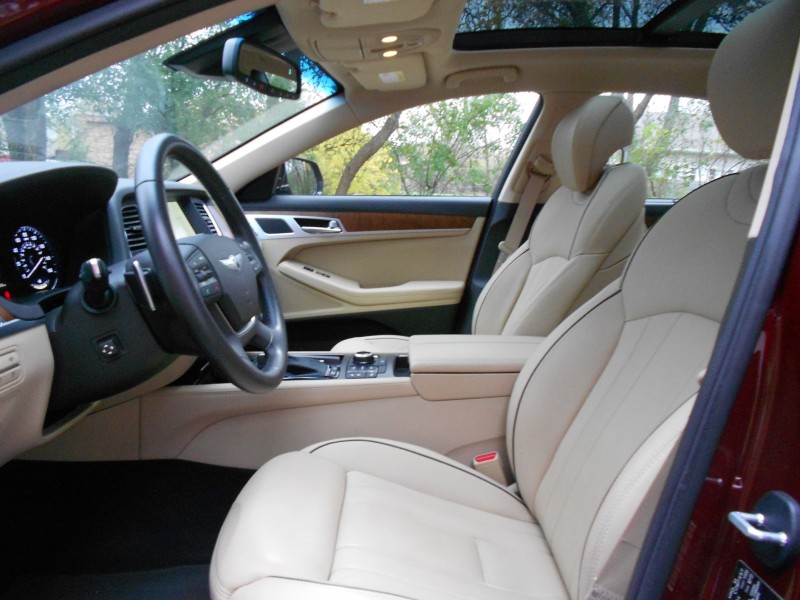
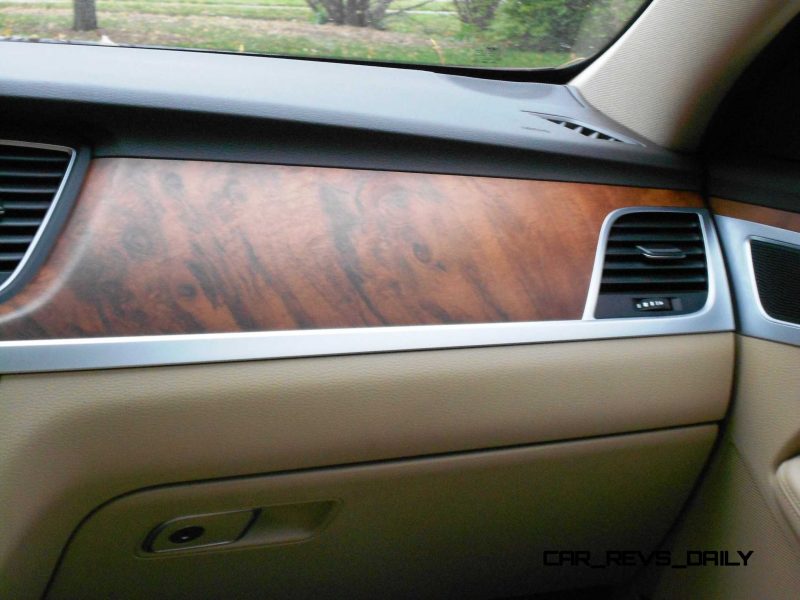
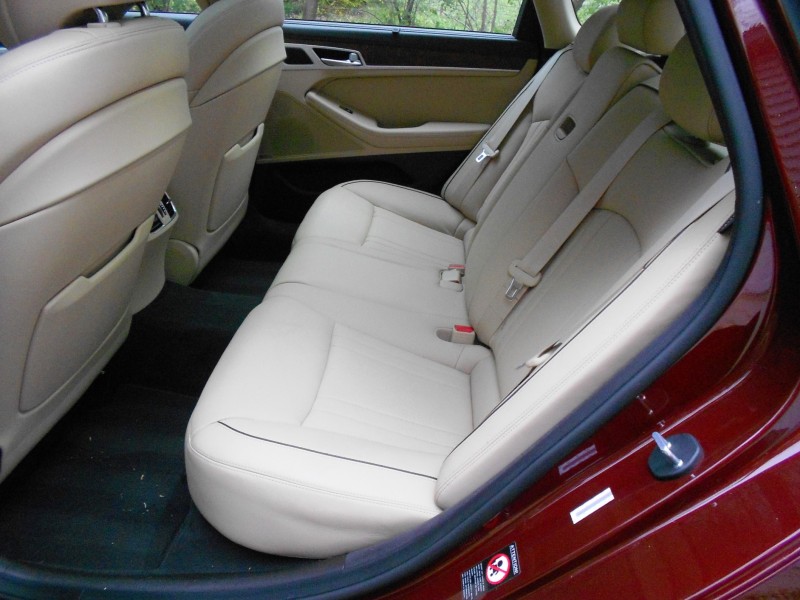

The layout of the interior is both stylish and intuitive, with all the controls where you’d expect them to be. All the controls have a nice look and feel. The dash and door wood trim accents actually look and feel like real wood, rather than the overly lacquered trim in most luxury vehicles that make the wood look and feel exactly like plastic.
The 12-way perforated soft leather seats are very comfortable and are both heated and cooled. And unlike the Lexus GS we tested a week earlier, the cooled seats worked well, and the heated seats were also excellent, with the seat back getting very warm, and not just the seat itself. That perforated leather look is carried into the door panels and speaker covers, for a handsome integrated look. Surprisingly, the steering wheel was not heated, which is about the only feature we missed on the car. Rear seat passengers are also treated to lounge-like comfort with supportive seats and limo like leg and headroom. Interior volume in the Genesis is class leading, and the trunk will swallow plenty of luggage and cargo.
The list of standard amenities is long, and include auto dimming headlights, high beam assist, rain sensing wipers with auto defogging windshield, auto dimming rearview and outside mirrors with puddle lights, electric trunk closure, front and rear park assist warning in addition to the rearview camera, electric tilt and telescope wheel, electric rear window sunshade, 8” Nav screen, and 7” information display between the tach and speedo.
A round control knob on the center console helps you navigate between screens, and it works better than most, unlike the mouse type control on the Lexus GS. There are also redundant controls for the HVAC system and radio controls on the center stack for quick and easy adjustments. Hyundai has dialed in all of the infotainment and tech features about as well as any manufacturer.
The only option on our test car was the $3,250 Ultimate Package. It includes a Heads-Up Display, a Premium DIS navigation system with a larger 9.2” hi-def screen, a Lexicon 17-speaker discrete Logic 7 audio system, continuous dampening control suspension, and more.
But it’s the Heads Up display that is the best feature, and worth the price of the package. It projects onto the lower windshield a lot of good information including your speed, the speed limit of the road you’re traveling on, (and it even changes when you’re in a school zone) the blind spot warning system, which also appears on each side view mirror. If you are using the standard radar cruise control, it shows the set speed, and following distance you’ve set up. If you’re using the Nav system, it will show you the upcoming turn, and has a bar graph to show you how close you’re getting to the turn.
The exterior styling of the Genesis is understated elegance. The front end is reminiscent of an Aston Marten, complete with a winged looking hood badge. The jewel like head and tail lamps sweep into the fenders, and the character lines enhance the sleek shape. As I was getting into the Genesis in a parking lot, a man approached and gushed, “Wow that is a beautiful car. What is it?” I told him it was a Hyundai Genesis, and he said, “Really? What a great looking ride . . . just beautiful.” I curiously waited to see what he was driving, and he got into a late model BMW 5 series.
The MSRP for this Genesis is $51,500. The V-6 model starts at $38,000. The price as tested came to $55,700. That is a lot of money, but the Genesis is worth it based upon its capabilities. Add in the value quotient, and it’s an even better deal.
The Genesis won’t put the German competition out of business any time soon, even with its advantage in value. Many luxury buyers want / need to have an accepted upscale brand name attached to the car they drive. Image is as important as the car itself. But for someone what has risen up the Hyundai brand ladder and has been very happy with their other cars, this will be an aspirational car to step up to. And for luxury buyers who crave an outstanding vehicle more than just a hood badge, this Genesis will be a great fit for them, too.
2015 Hyundai Genesis 5.0 Review
By Ken Glassman
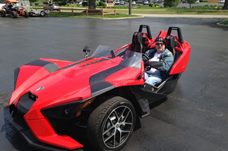
Ken “Hawkeye” Glassman has been a motor journalist for over 30 years, reviewing automobile, as well as motorcycle ride reviews and accessory reviews.
His car articles have appeared in Robb Report Magazine, Autoguide.com, Car-Revs-Daily.com and other media. His work has also appeared in Road Bike Magazine, Motorcycle Tour and Cruiser, SpeedTV.com, MotorcycleUSA.com and others.
As motorcycle columnist for The Daily Herald in suburban Chicago, the paper became the only major circulation newspaper in the country to have a separate weekly section devoted to motorcycles. Later he wrote a weekly column for Cyclefocus Magazine.

